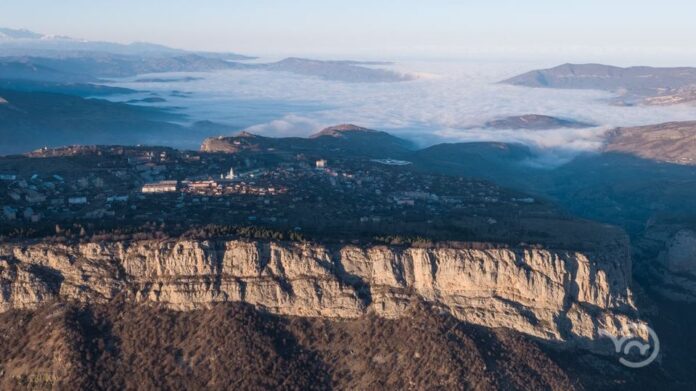It is a customary in the Armenian political reality to look for culprits elsewhere for our own defeats. The first Prime Minister of Armenia Hovhannes Kajaznuni, 100 years ago and after the fall of Kars, said: “To complain bitterly of bad luck and to look outside of us for the cause of our misfortunes is one of the characteristic features of our national psychology.”
A century ago, when the Republic of Armenia lost its 30,000-square-kilometer homeland and became Soviet, the main political and ruling force of the day, the ARF, blamed their defeat on Bolshevik Russia, Kemalist Turkey for forming an alliance and drowning the 1000 days old infant republic in blood.
Yes, it is a historical fact that Lenin and Ataturk were allies over their common interest in Armenia.
But was that the only cause for our defeat and loss of land?
Was abandoning Kars almost without a fight only due to Bolshevik-Kemalist cooperation?
Weren’t we Armenians or the military-political leadership of those days not to blame?
After the loss of Kars, Ani, Surmalu, Nakhijevan and other territories, not only ARF operators but others as well, left a lot of political literature where everyone else is blamed such as the Russians, the Turks, the British, but not themselves, that is to say, we the Armenians.
The Russians were culprits for their deceitful policy; the Turks for their genocidal mania; the Azeris for rendering our lives miserable. The Americans were at fault for drawing Wilson Armenia on paper only. The British were guilty for their bastardly conduct by walking away from the Caucasus.
One hundred years later, we lost the 44-day war. We lost what we had liberated during the two and a half years long First Artsakh War, at the cost of 6,000 lives. In six weeks, leaving behind more than 4,000 lives and up to 10,000 wounded, we lost more than 8,000 square kilometers of land with the roads, schools, churches and buildings built on that land during the past three decades, including many architectural monuments.
Instead of understanding the root causes of this shocking defeat, we found two culprits: the betrayal of Nikol Pashinyan, which is propagated by representatives of the former governments; and the Russian-Turkish conspiracy propagated by the anti-Russian elements in Armenia, tacitly endorsed by the current authorities.
Undoubtedly, Nikol Pashinyan is the number one guilty and responsible for the loss of Shushi and the total defeat, just as the ARF was the number one guilty and responsible for the total loss of Kars in 1920. Why? Because, first and foremost, the ruling power of the day is the responsible for victory as well as defeat.
Nowadays, a myth is slowly crystallizing that the Russians did not help us, did not give us weapons, and brokered peace only after Shushi fell, because that was what the Russians and the Turks had agreed upon.
It is paradoxical that the government of the first President Levon Ter-Petrosyan had nothing to do with the liberation of Shushi in 1992 and that it was by the grace of the opposition and the military-political leadership of Artsakh. It’s a woeful, but that myth-fiction was agressively propagated from 1992 to September 2020.
Of course, by carrying out a peacekeeping mission in Artsakh, Russia, first of all, pursues its interests. The same is true for the 102nd military base it maintains in Gyumri or for its deployment mission guarding along the Armenian-Turkish/Iranian border. But, which country – the United States, France, is not guided by own interest?
Now that we are pointing our fingers at the Russians, do we not want to ask what the Americans, the French and our other friends did?
What did we do to have made the defeat less humiliating?
What is our fault, the fault of each and everyone of us?
Myths can be thought of as folklore for moving forward. But the problem is that these myths are opening the doors to new defeats for Armenia and for the Armenian people. They are disassociating the Armenian political thought from reality, and from political common sense and deliberation.
It is like the story of an eternal friend and an eternal enemy; in this case, a permanent culprit. That is to say there are enduring culprits for the fall of Kars and Shushi – the Russians, the Turks – the Russian-Turkish conspiracy.
If the Turks and the Russians are to blame, it means that we have been naive, short-sighted, politically ignorant, that we could not plan, attempt to find common ground with the Russians, Turks, and other immediate neighbors; and that we could not know the potential of our forces to move forward taking into account our resources and not build a policy on dreams and longings.
Yes, Nikol Pashinyan is guilty and responsible.
What about Arayik Harutyunyan and the military-political leadership of Artsakh?
What about Armenia’s fiery foreign minister and ostentatious/populist defense minister?
What about the peoples of Armenia and Artsakh who did not fight bravely enough for their homeland?
What about the author of these lines, who was afraid to write about the possibility of peace every day, because the neo-Nazis would accuse him of pacifism, defeatism, even betrayal and Turkism?
What about the Diaspora, which did not want to hear about a compromise solution? But we did not see them sending battalions during the war. I am not saying that you should have come and give your lives for Armenia and Artsakh instead of my son and me. But you, too, were the proponents of childish having it all.
Defeat is always an orphan, but to this extend…
I could not have imagined.
Tatul Hakobyan
Translated by Vahe H. Apelian
https://vhapelian.blogspot.com/
January 26, 2021












